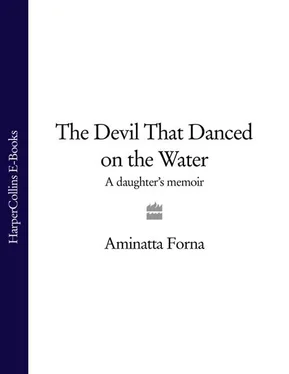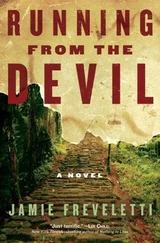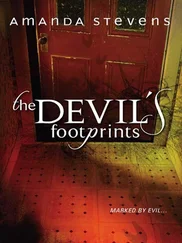‘This is Your APC Candidate.
He is your Karefa-Smart’s Choice
Vote APC all the way.’
Siaka Stevens had personally asked him to take on John Karefa Smart’s former seat of Tonkolili West and our father had agreed. It was his home constituency. My father was the obvious – indeed, the perfect – choice.
As the election date drew closer, my father was absent round the clock. His constituency was a whole day’s journey away. By now the small, discreet meetings had burgeoned into rallies attracting huge crowds, but in order to hold a political meeting of any kind the candidates needed the approval of the paramount chief, most of whom were loyal to the government. It became routine for permission to be refused. Under these circumstances any meeting that went ahead, impromptu or otherwise, was likely to be heavy-handedly broken up by the police. Across the country there were frequent, sporadic clashes between government and opposition supporters.
Koidu, in Kono, lay on the axis between the SLPP Mende strongholds of the eastern provinces and the Temne north, which was mobilising behind the APC. One afternoon, on the way back to our house from school, with we three children in the car, my mother turned a corner and drove into a pitched battle between several hundred APC and SLPP supporters on the main street in town. Some people were waving guns, others hitting each other with their fists, sticks – anything they could lay their hands on. My mother pulled up, intending to reverse out. But the people nearby, who were as much engaged in the fighting as anyone else, recognised our car and started to shout for people to clear the road. There was a pause in the battle, like a black and white slapstick movie when the music stops, and we drove through the crowd. When we emerged on the other side and looked out of the rear window, the music and the fighting had started up again.
Some evenings later my mother was at the ‘nightclub’ having a drink with her Lebanese friends. It was a favourite haunt of the Lebanese merchants and other well-to-do folk and she often went to sit and chat in the evening air. The bar was next to the mosque, a typical provincial prayer house built in concrete with four squat, plain minarets, one of which housed the muezzin. These were the days before it became standard practice to rig up an automated loudspeaker system, and in Koidu the muezzin still climbed the stairs of the tower and called the faithful to prayer five times a day.
That night my mother’s attention was caught by the familiar sound of the prayer call starting up. It was well after midnight – nowhere near time for prayers. Gradually it became apparent to everyone this was no muezzin, but an audacious protester who had seized the mosque’s loudhailer. For a time everyone was still as the words ricocheted off the tin roofs, fluttered like feathers down into the streets, whizzed around the heads of the people as they sat on the steps of their houses.
‘No more Albert, no more Margai, No more Albert over me,’ he sang.
Within minutes a crowd of supporters and detractors gathered in the street below the mosque, shouting encouragement or insults accordingly. Soon enough they started to scuffle between themselves. The man in the minaret sang on: ‘And before I’ll be a slave, I’ll be buried in my grave.’
Thirty minutes later the police arrived. They dragged the protester down from the tower and took him away, but not before they had given him a hearty beating in front of the crowd of onlookers.
By now SLPP support in Kono was wavering badly. Determined to win at all costs, some in the government were beginning to resort to extreme tactics. My father was campaigning in other parts of the country, supporting candidates in more marginal seats, as well as canvassing for votes in his own district. Driving home from the south, he stopped one night for petrol at Panguma Junction, by coincidence encountering a local APC candidate on the run from the police. A warrant had been issued for the arrest of all four opposition candidates in the region: the plan was to stop them registering themselves as candidates by using the law to hold them for forty-eight hours over the crucial registration period. My father gathered the four together and urged them to stay. He found a good lawyer, who also happened to be the cousin of the attorney-general, and they all went to the police station and challenged the local police chief. By the end of the afternoon the warrants were withdrawn.
There were only four weeks between the date parliament was dissolved and polling day. With my father away for the whole period, life in our house moved quietly from day to day. My mother followed her usual routine of work, friends and family life. Ade Benjamin, an old friend from Freetown, turned up unexpectedly to stay and the two of them went out dancing together, lifting her spirits considerably. Meanwhile, she waited to hear from my father.
Even during this intense period my mother remained detached from the swirl of political activity around her, despite the fact that the election outcome and our own lives were now completely intertwined. Although she chose not to say so to my father, she was frustrated to see the success of the clinic faltering. My mother was as pragmatic as my father was idealistic; she saw herself first and foremost as a doctor’s wife, and it had been her plan to remain one.
Polling day, when it came, created a storm of speculation and excitement in the rest of the country. This was the second democratic election in our fledgling state, and a great deal hinged on it, including, as far as many saw it, the future of democracy itself. People were beginning to anticipate a victory by the opposition APC and an end to the Margai government. The anticipation and even trepidation as people queued to cast their votes was intense. Yet the tempest passed over our small house, leaving the domestic scene inside untouched.
The news took a while to reach us that my father had won his seat. He not only took Tonkolili West for the opposition but by the greatest margin and the greatest number of votes cast in favour of any one candidate during the entire election: close to eighteen thousand. The ruling party candidate had not even managed to secure five hundred.
In Kono the APC took two of the four seats. In Freetown every single seat went to the APC. The party’s triumphs were sweeping the country as opposition candidates toppled government incumbents in constituency after constituency. Victory began to look inevitable.
Four days later, in the early morning, a car arrived at the house. It was a long, low Mercedes, one my mother recognised as belonging to one of the wealthiest of the Koidu diamond merchants. Inside were two young APC party workers, smartly turned out in clean white shirts, unrecognisable from the sweat-stained young activists we were used to seeing. They told my mother they were to take us down to Freetown to attend the swearing-in ceremony for the new prime minister and cabinet.
The inside of the car was air-conditioned and smelled of leather. Under my bare legs the seats were cool and smooth. We took the new road to Freetown; it was still being built and hadn’t been tarred but it surpassed the old, rocky road. Our route that day took us through Magburaka, in Tonkolili district, and it was strange to see posters and flyers of our father’s face pasted everywhere: on shop fronts, on the sides of market stalls, rows and rows of them. People cheered as we drove in; young men ran alongside the car to catch our companions’ outstretched hands; little boys dressed only in shorts danced barefoot in the dust, sticking out their bottoms and stamping their feet, and the driver sounded the horn at pedestrians who waved back at us.
We pulled up outside a house in the middle of the town and within moments the car was surrounded by people. There was a lot of backslapping and clapping as our companions climbed out. We were all led inside and my mother and we three waited while the clatter of excited voices speaking in Temne flew around our ears.
Читать дальше












